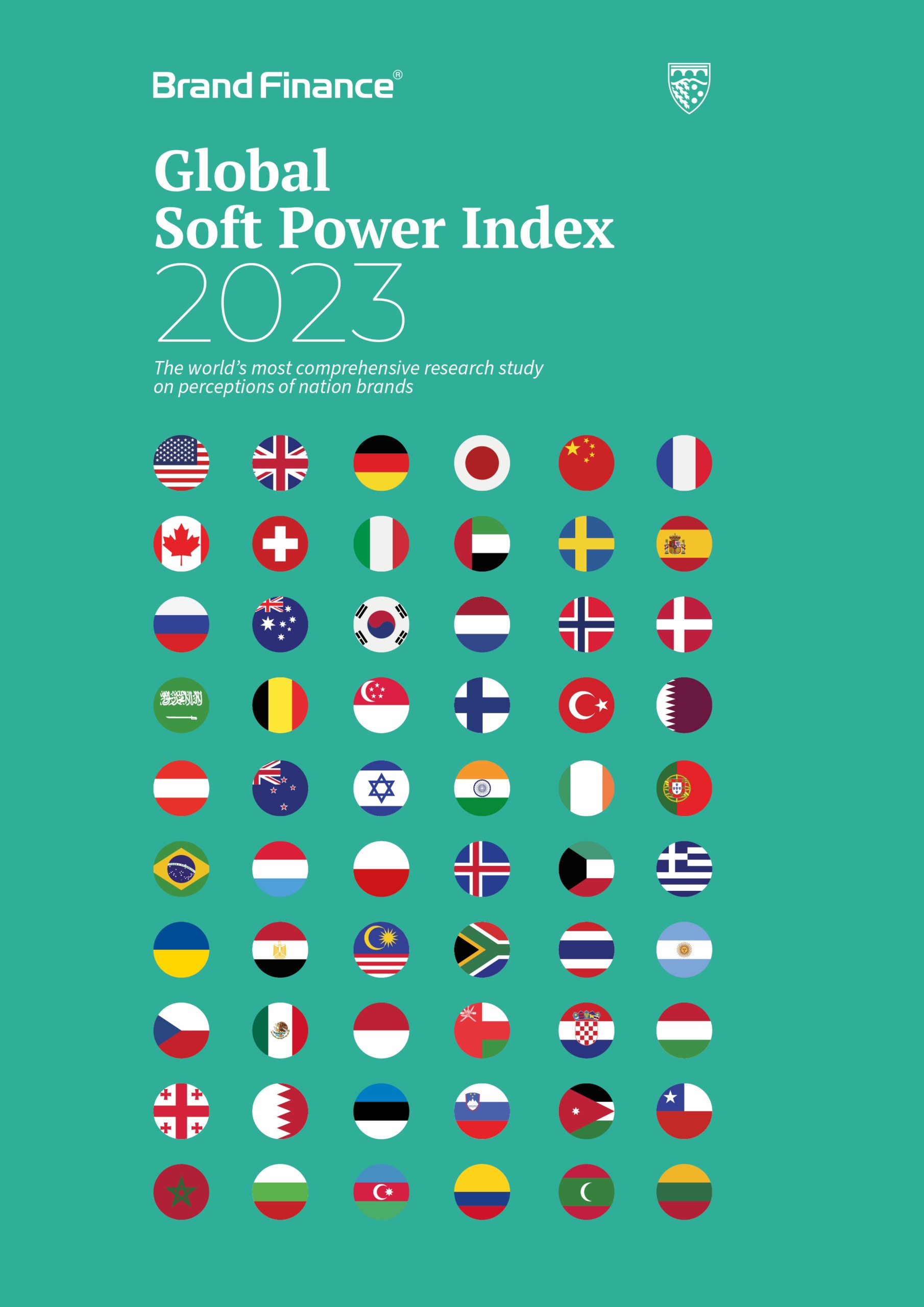This article was originally published in the Global Soft Power Index 2023.
The economics of Soft Power
Brand Finance defines Soft Power as “a nation’s ability to influence the preferences and behaviors in the international arena through attraction or persuasion rather than coercion” and it measures it through the Global Soft Power Index – the world’s most comprehensive research study on perceptions of nation brands, surveying opinions of 150,000+ respondents in 100+ markets worldwide. As the world becomes increasingly connected, Soft Power is a key tool that places turn to in order to achieve economic success.

Place Branding Director, Brand Finance
Therefore, we set about an analysis that would allow us to better understand how the dynamics of Soft Power are intertwined with the performance and economic gains of a place brand. We looked at two of our annual rankings – the Global Soft Power Index, which measures perceptions of nation brands, and the Brand Finance Nation Brands ranking, which tracks and assesses the value and strength of nation brands. Our analysis proves that despite the existence of many and various factors that affect the performance of place brands, perceptions and Soft Power that comes with them command a very strong predictive power, suggesting that improving perceptions can boost performance. Although this analysis was conducted on more accessible nation brand data, we can easily assume that the takeaways apply in the same way to regions and cities.
The more Soft Power, the better performance of nation brands
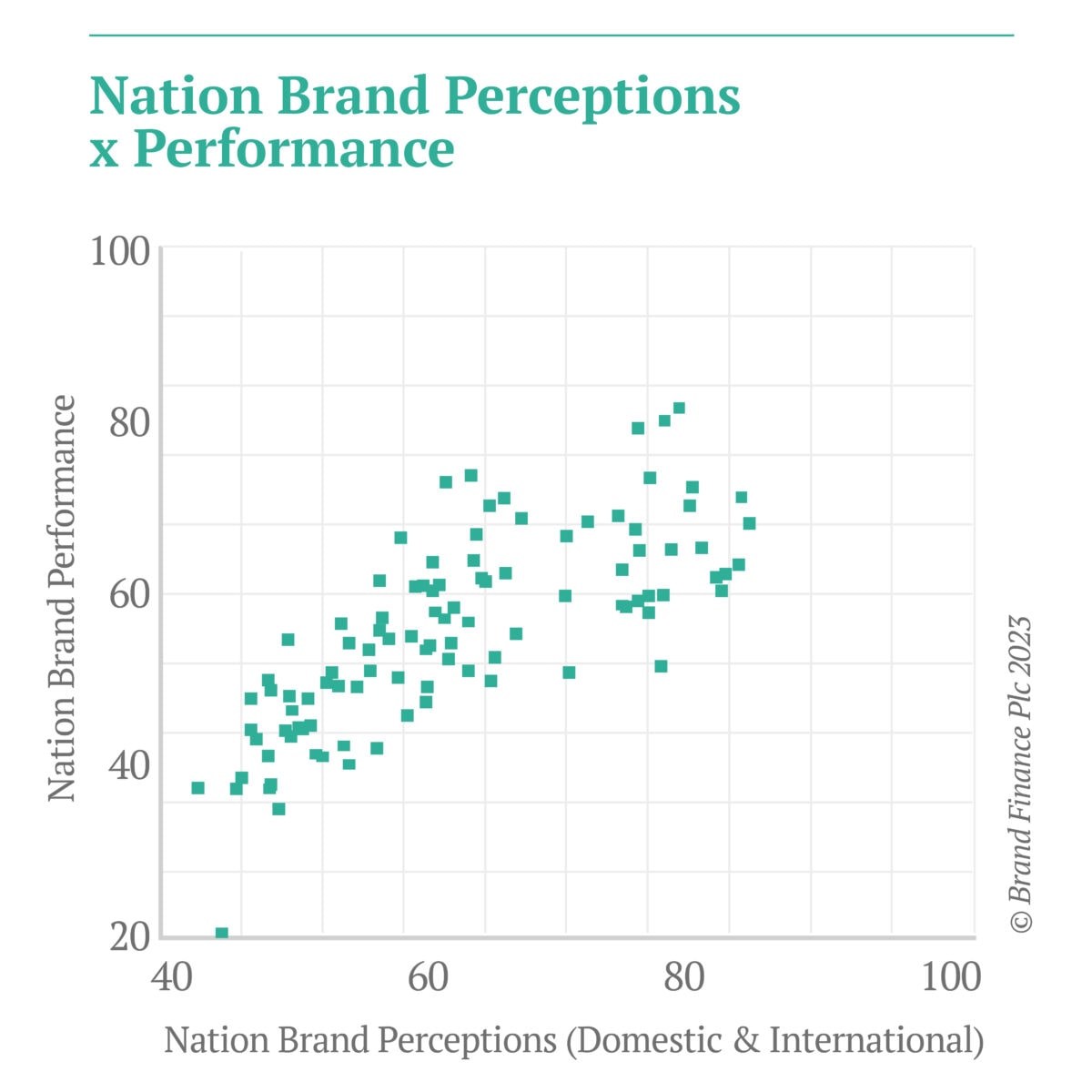
There are five key areas of financial impact that is measured within the Nation Brands ranking: economy, trade, investment, tourism, and talent. Performance across these five areas, combined, generates a Nation Brand Performance score. The relationship between a nation’s performance and its Soft Power is shown in chart below.
Analysis of this data shows that whilst there are many ubiquitous influences on a nation’s performance, Soft Power can create a tangible payoff.
Nations with strong perceptions are seen to generate strong performance - United Arab Emirates with leading perceptions towards global influence, international relations, and business and trade is a nation that is effectively leveraging its Soft Power to drive economic performance. Similarly, Singapore and Ireland have leveraged their strong global reputation in creating positive economic performance. At the same time, weaker global perceptions are seen to correlate with weaker economic performance such as in the cases of Myanmar, Zimbabwe, and Sri Lanka.
Japan is the most prominent outlier within this analysis. Japan ranks 4th on the Global Soft Power Index, driven by strong reputation, perceptions towards Business & Trade, Education & Science, and Sustainable Future. Despite strong perceptions, the nation’s economic growth is affected by many and varied influences such as the nation’s weakening currency and ageing population.
Perceptions of Business & Trade correlate with GDP growth
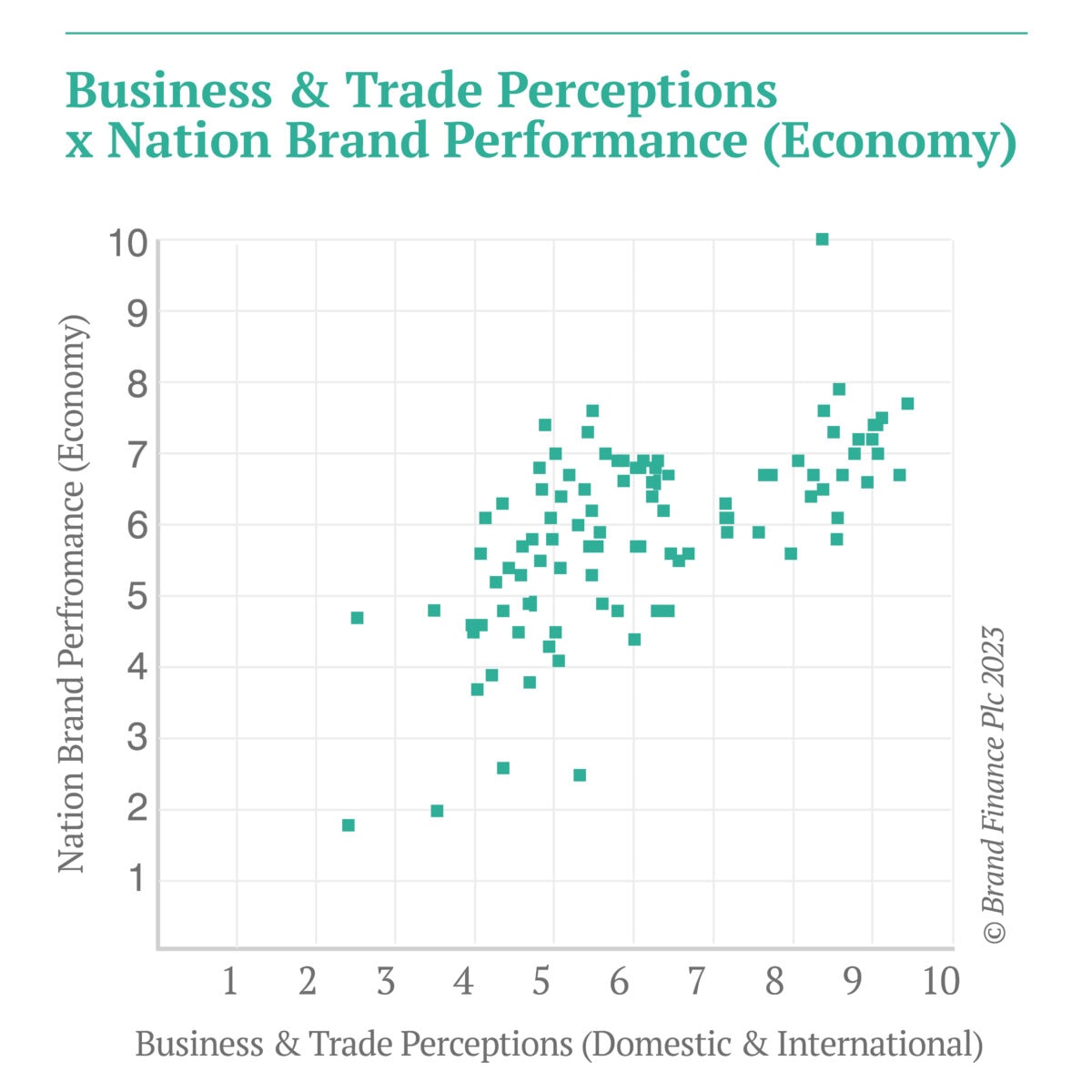
We narrowed down the analysis from the relationship between the overall Global Soft Power Index and Nation Brand Performance scores, to assess the relationship between perceptions of particular Global Soft Power Index pillars and the various pillars of Nation Brand Performance, starting with macroeconomic measures – GDP per capita and GDP growth.
The results from our two studies show that perceptions towards a nation’s Business & Trade can support macroeconomic performance. United States, Singapore, Canada, and Australia are nations that rank consistently in the top 15 globally on perceptions towards business and trade. This is also seen to reflect in their economic performance in terms of some of the highest GDP per capita globally and consistent economic growth. The outliers to this relationship are Ireland, Ukraine, Sri Lanka.
Ireland has been able to generate significantly stronger economic performance as a nation with one of the highest GDP per capita globally and continuously outperforms the rest of the Eurozone in terms of economic growth, despite not ranking as high on perceptions towards Business & Trade. Ukraine and Sri Lanka, on the other hand are nations, who have not been able to effectively convert their perceptions towards Business & Trade, due to external and internal crises affecting them.
Talent attraction is driven by strong education systems
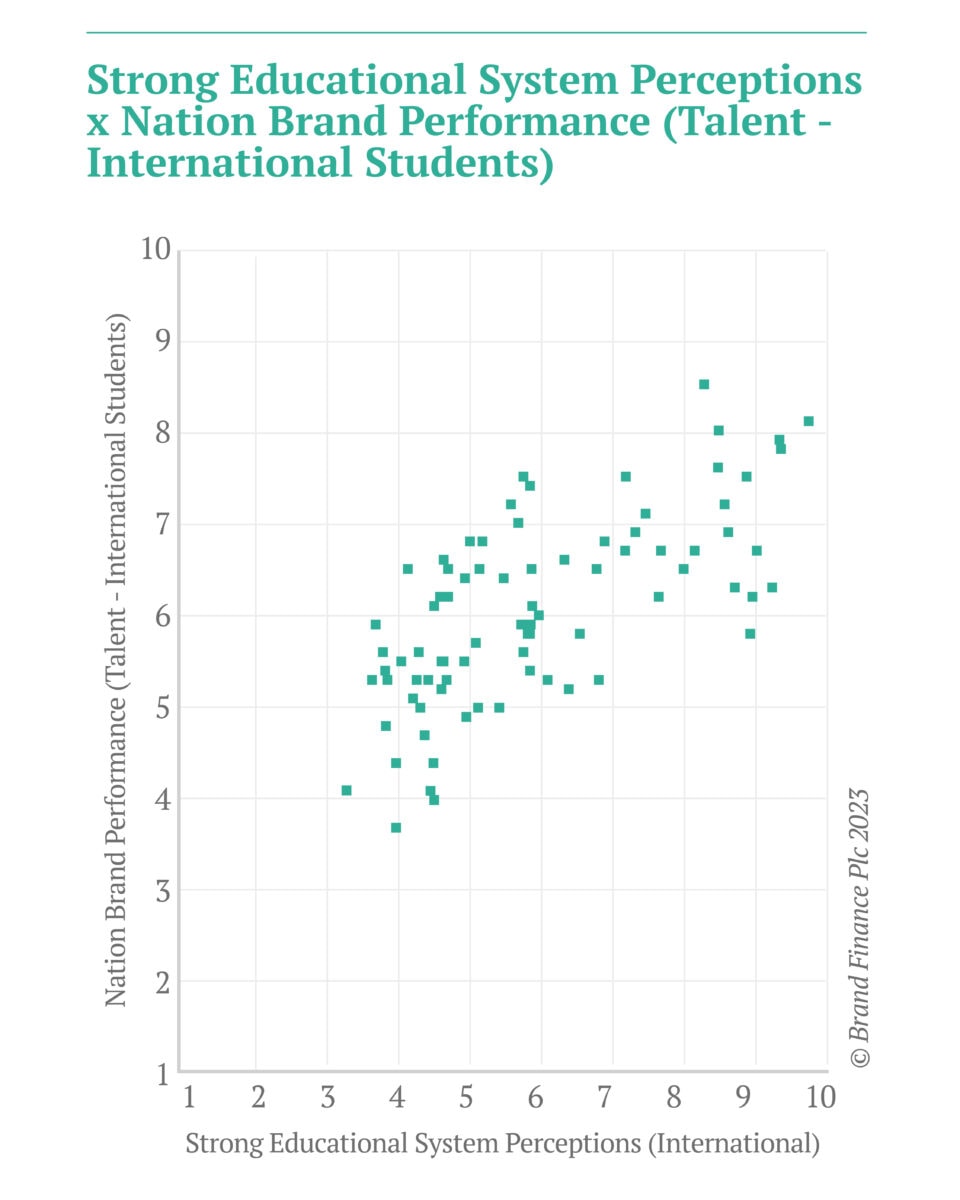
The analysis of the predictive power of Soft Power in driving Nation Brand Performance was further narrowed to look at how perceptions of a particular nation brand attribute can impact talent attraction.
Attracting talent into a country plays a key role in building future prosperity and global competitiveness. Students looking for renowned education programmes abroad are a key target.
Our data proves that perceptions towards a nation’s “strong education system” can positively impact the inbound number of foreign students.
United Kingdom, Canada, and Germany are nations that rank in the top 3 on global perceptions towards “strong education system” due to their global reputation, great student lifestyle, and a high standard of living. These nations have also effectively leveraged their perceptions and are amongst the countries that attract the highest number of international students globally.
Tourism benefits from positive place perceptions
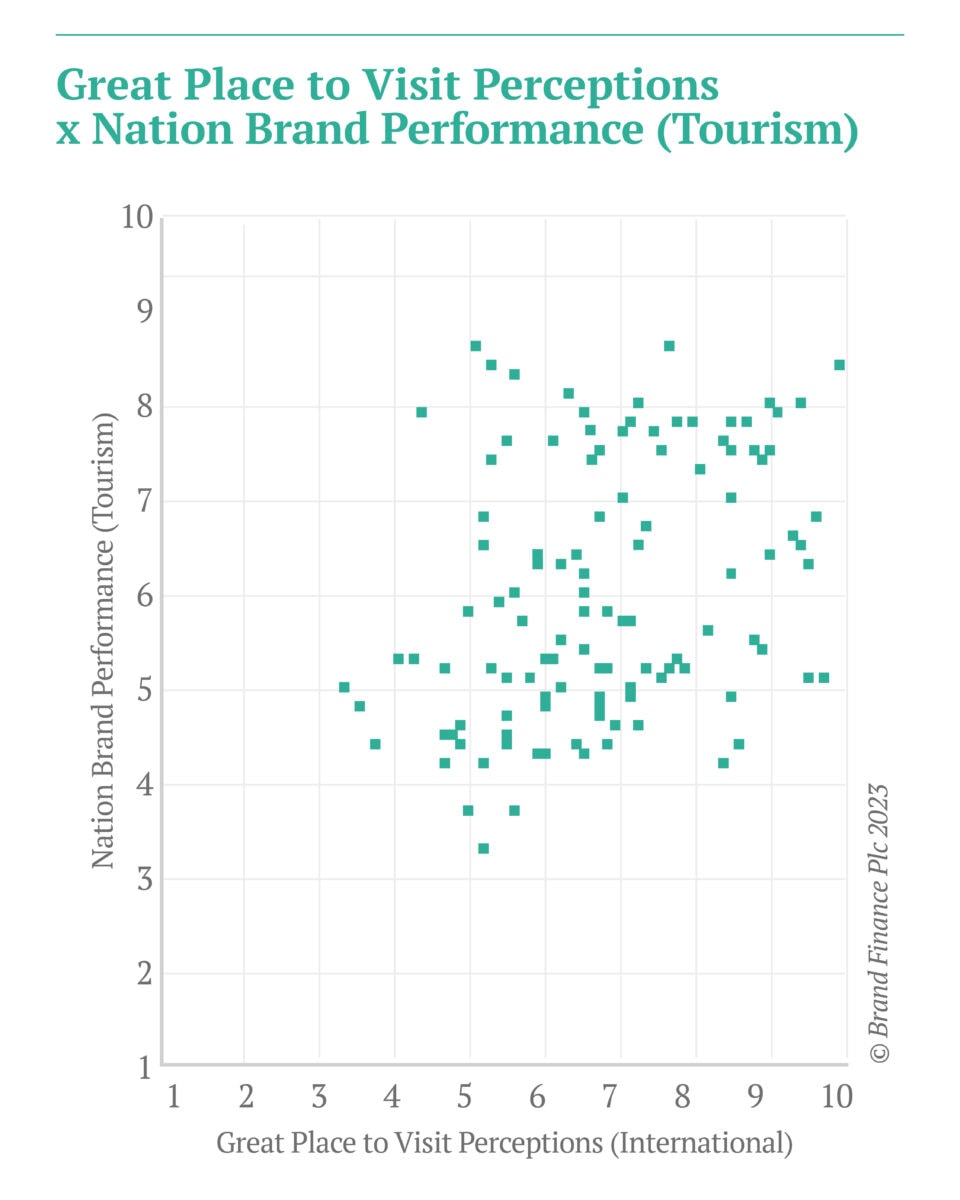
The final performance pillar that we looked at was tourism. The tourism industry is a vital sector that contributes to the overall success of many economies and nations adopt strategies to leverage their tourism offering on a global platform.
Our data proves that being viewed a “great place to visit” can boost a nation’s performance on tourism.
Nations that score strong on “great place to visit” such as Maldives, Switzerland, and Spain have effectively converted these perceptions into driving tourism performance within the Nation Brands rankings. Japan and Thailand are two travel destinations that show room for further leveraging their strong perceptions to drive tourism performance. Whilst both Japan and Thailand generate strong tourism spend, arrivals per population rank lower than among competitor nations.
Leveraging Soft Power for economic performance
Soft Power is widely acknowledged as the preferred tool to advance key interests of nations. Our data and analysis of the dynamics between nation brand perceptions and economic performance proves a clear statistical relationship. Soft Power generates positive impact across the pillars of performance, and a greater understanding of place brand perceptions – nation, region, or city – can pave the way to a more impactful management that amplifies economic benefits.

